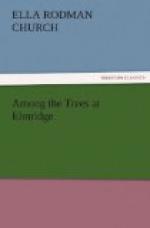“Like snowballing,” said Malcolm; “only the prickers must have stung. What grand times they had with their chestnuting!”
“These gay, thoughtless people,” replied his governess, “almost live in the open air and enjoy the present moment. It is not easy to tell what they would do without these bountiful chestnut-harvests, for their principal article of food is a thick porridge called polenta, which they make from the ground nuts. In France a kind of cake is made from the same material, and the chestnuts are prepared by drying them in smoke. Another dish is like mashed potatoes, and large quantities are exported in the shape of sweetmeats, made by dipping them, after boiling, into clarified sugar and drying them.”
“Miss Harson,” asked Clara, “why are horse-chestnuts called ’horse-chestnuts ’? Do horses like ’em?”
“Not usually,” was the reply. “The nuts are sometimes ground and given to horses, but, as sheep, deer and other cattle eat them in their natural state, it would seem more reasonable to name them after some of those animals, if that was the reason. It is likely that because they look like chestnuts, but are much larger, they were called ‘horse-chestnuts,’ The tree is not in any respect a chestnut; and when it was first planted in England, some centuries ago, it was called ’a rare foreign tree,’ and was much admired. It is supposed to have come from India. The large nuts are like chestnuts in appearance.—Except, Edith, that they have no ’cunning little tails.’—In the month of May there is not a more beautiful tree to be found than the horse-chestnut, with its large, deeply-cut leaves of a bright-green color and its long, tapering spikes of variegated flowers, which turn upward from the dense foliage. The tree at this time has been compared to a huge chandelier, and the erect blossoms to so many wax lights. The bitter nuts ripen early in the autumn and fall from the tree, but long before this the beautiful foliage has turned rusty in our Northern States, and is no longer ornamental. The overshadowing branches, which give such a pleasant shade in summer, early in autumn begin to show the ravages of the insects or the natural decay of the leaves.”
“Then,” said Malcolm, “it isn’t a nice tree to have, and I’m glad that there are elms here instead.”




